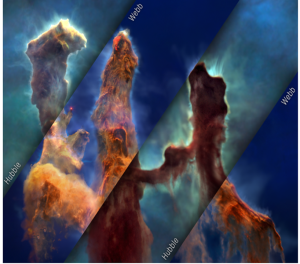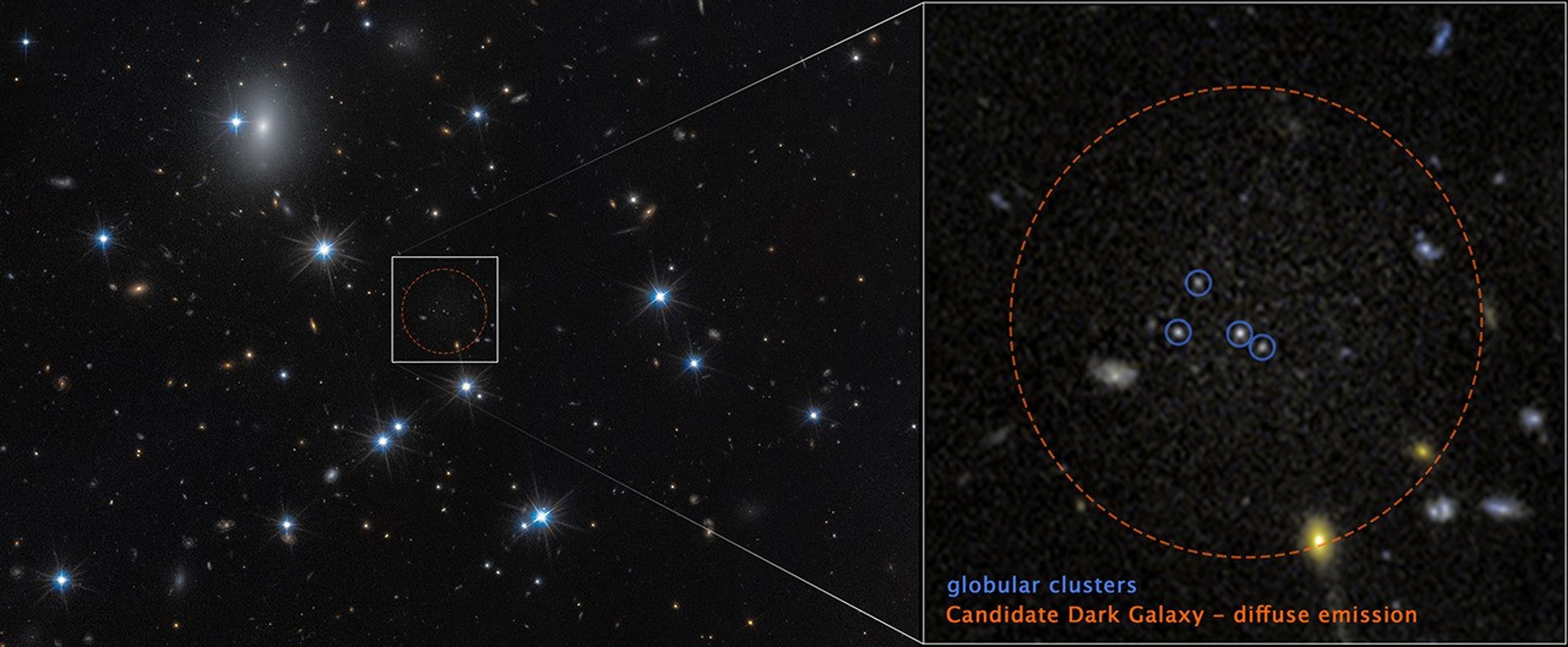NASA’s Universe of Learning – a partnership among the Space Telescope Science Institute (STScI), Caltech/IPAC, the Center for Astrophysics | Harvard & Smithsonian, and the Jet Propulsion Laboratory and part of the NASA Science Activation program portfolio – recently released a new 3D visualization of the towering clouds of cosmic dust and gas at the center of the star-forming region known as M16, or the Eagle Nebula. This video, which uses data from NASA’s Hubble, James Webb, and Spitzer space telescopes, as well as the Chandra X-ray Observatory, is the most comprehensive and detailed multiwavelength movie yet of these star-birthing “Pillars of Creation.”
“By flying past and amongst the pillars, viewers experience their three-dimensional structure and see how they look different in the Hubble visible light view versus the Webb infrared light view,” explained principal visualization scientist Frank Summers of STScI in Baltimore. “The contrast helps them understand why we have more than one space telescope to observe different aspects of the same object.” Summers led the video development team.
The Pillars of Creation, made primarily of cool molecular hydrogen and dust, are being eroded by the fierce winds and punishing ultraviolet light of nearby hot, young stars. Finger-like structures larger than the solar system protrude from the tops of the pillars. Within these fingers can be embedded embryonic stars. The tallest pillar stretches across three light-years, three-quarters of the distance between our Sun and the next nearest star.
The movie takes visitors into the three-dimensional structures of the pillars. Rather than an artistic interpretation, the video is based on observational data from a science paper led by Anna McLeod, an associate professor at the University of Durham in the United Kingdom. McLeod also served as a scientific advisor on the movie project.
The 3D structures are approximations for how the pillars are lined up in space like a row of trees, based on observational data. The goal is to give viewers an experiential view, so that they can better interpret the otherwise flat, two-dimensional images from telescopes. This 3D understanding allowed the team to create 3D printable files of the Pillars using the newest data.
On the same day or the visualization release, Dr. Frank Summers led a live-streamed panel discussion with attendees covering "A Deep Dive into the Creation of the Pillars of Creation" at the AstroViz Community Practice meetup. The panelists and attendees engaged in a deep dive into the transformation of 2D views of the Pillars of Creation into a scientifically-vetted 3D visualization.
The new visualization helps viewers experience how of the world’s most powerful space telescopes work together to provide a more complex portrait of the pillars. Hubble sees objects that glow in visible light at thousands of degrees. Webb’s infrared vision, which is sensitive to cooler objects with temperatures of just hundreds of degrees, pierces through obscuring dust to see stars embedded in the pillars.
- Experience the Visualization: Pillars of Creation
- Access the 3D-Printable Pillars of Creation Model
- Explore Pillars of Creation Resource
- Watch AstroViz Community Meet Up Recording: Astrophysical Artistry | AstroViz Community Meetup | June 2024
As of July 25, 2024, the visualization has received 2,457,930 views, made 467,318 impressions, and been featured in 755 online media articles reaching 3.8 billion potential readers. A variety of additional learning resources related to the Pillars of Creation and star-forming regions, including the 3D print files, sonification, and interactive to explore the Pillars in different wavelengths, can be found on the NASA's Universe of Learning website.
NASA's Universe of Learning s supported by NASA under cooperative agreement award number NNX16AC65A and is part of NASA’s Science Activation Portfolio. Learn more about how Science Activation connects NASA science experts, real content, and experiences with community leaders to do science in ways that activate minds and promote deeper understanding of our world and beyond: https://science.nasa.gov/learn
Credits:
- Visualization and video: Greg Bacon (STScI), Ralf Crawford (STScI), Joseph DePasquale (STScI), Leah Hustak (STScI), Danielle Kirshenblat (STScI), Christian Nieves (STScI), Joseph Olmsted (STScI), Alyssa Pagan (STScI), Frank Summers (STScI), Robert L. Hurt (Caltech, IPAC)
- Subject Matter Expert: Anna McLeod (Durham University)
- Script Writer and narration: Frank Summers (STScI)
- Music: Joseph DePasquale (STScI)
- 3D Model: NASA, STScI, R. Crawford, L. Hustak

Side-by-side images of the Pillars of Creation from Hubble (left) and Webb (right)
































